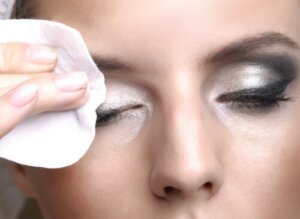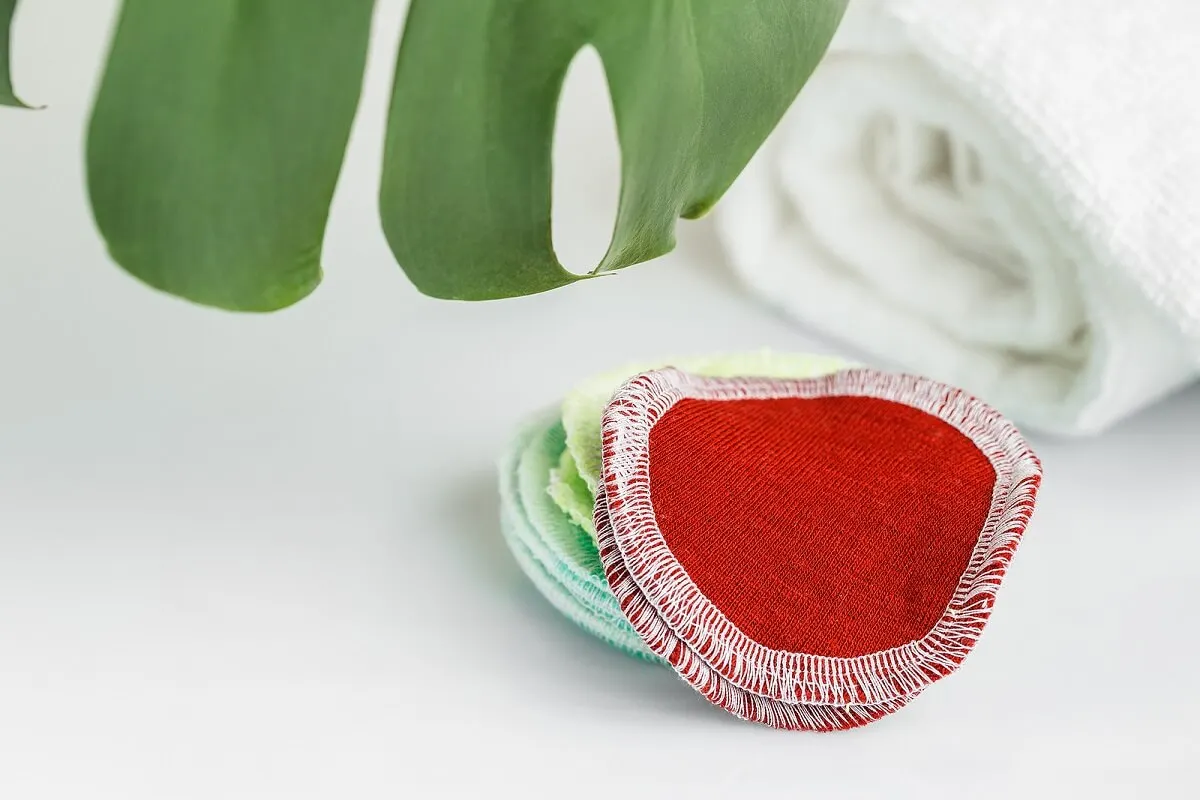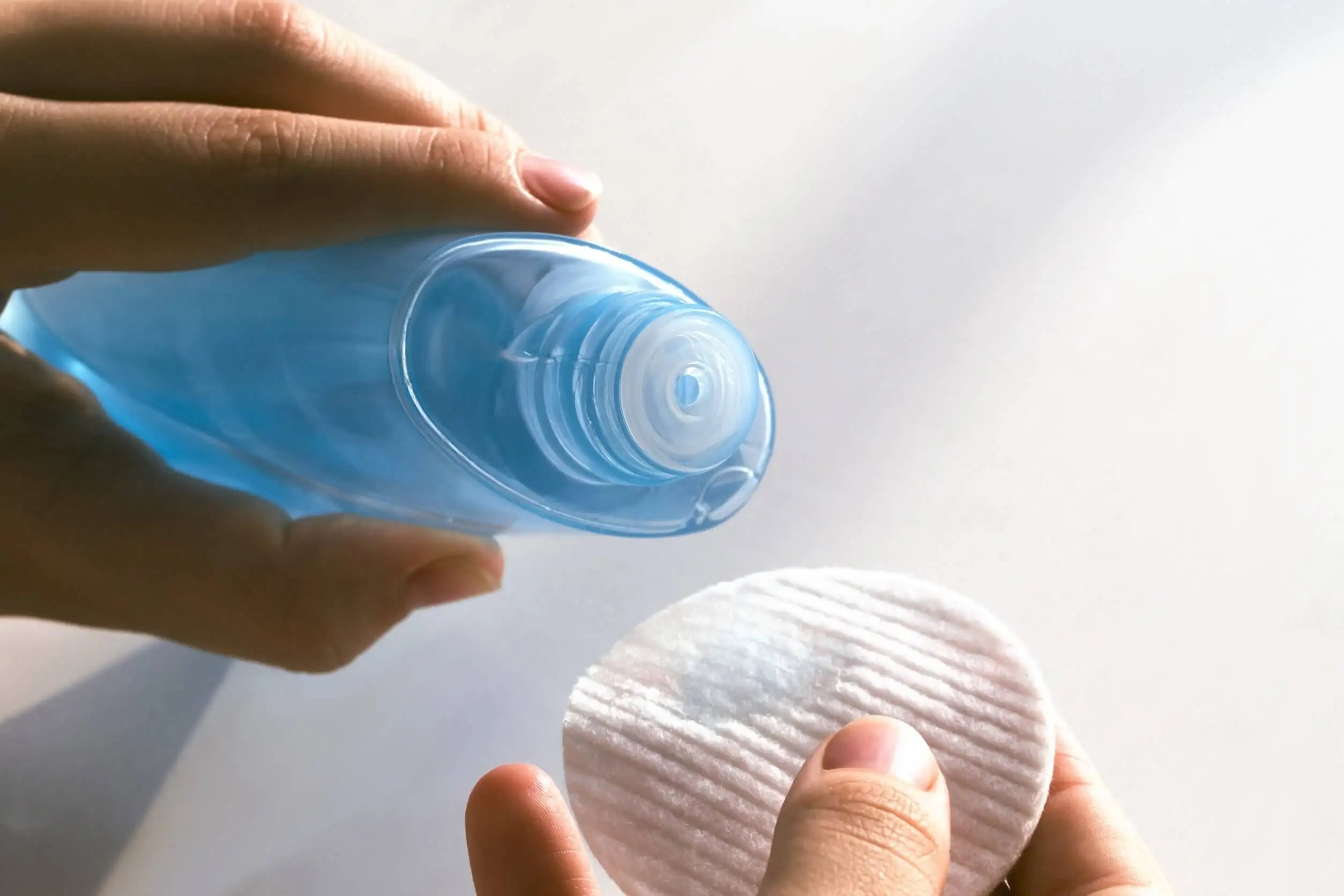Makeup Remover Wipes vs. Micellar Water


Reviewed and approved by the doctor Leonardo Biolatto
A dermis as sensitive as that of the face needs more than cosmetic functionality. Thus, it’s a matter of taking care of the skin’s health.
To do this, it’s important to use tools and ingredients that work effectively and are non-toxic. So, when it comes to wipes and micellar formulas, let’s take a look at what’s the best and healthiest option for taking care of your skin.
Like this article? We think you may also like to read: Nude Makeup: How to Apply It Without Failing in the Attempt
The myth of makeup remover wipes
Makeup remover wipes are made from non-woven textiles, previously moistened with make-up solvents, emulsifiers and solvents. Furthermore, these wipes consist of surfactants that sanitize the skin, bringing a presumed total cleanliness to the table.
However, the reality of the wipes is that they don’t completely carry away the dirt. The technique of dragging on the superficial mantle of the epidermis clarifies the skin but is not meticulous in collecting impurities.
The immediate consequence is the accumulation of residue, clogged pores, and damage to your skin.
Moreover, the wipes actually remove part of the makeup without providing a plus to your beauty ritual. Their practicality is therefore in question, since they imply an additional step in facial hygiene: washing the skin after using them.
Removing makeup with wipes is useful in an emergency, but adopting it as a regular habit is counterproductive because of the following reasons:
- They promote pimple outbreaks: People prone to acne and blackheads are more likely to suffer aggravations, as a consequence of incomplete cleansing.
- Makeup wipes can damage sensitive areas of the skin: It’s common that the packaging instructs to clean the whole face with the tissue, but it’s possible that the sweeping may tear the eye contour and pull out your eyelashes. To remove makeup from the periocular area, it’s therefore best to use specific cleansers that are alcohol-free and with a pH compatible with the acidity of the eye, as Offarm magazine explains.
- They often have aggressive ingredients: Some brands include chemicals, increasing the margin of adverse reactions. One of these sequelae is dermatitis. Actas Dermo-Sifilográficas mentions iodopropynyl butylcarbamate as a preservative present in cleansing wipes and identifies it as a main source of irritation.

Why should you remove your makeup with micellar water?
Micellar solutions consist of purified water combined with surfactant, moisturizing, astringent, and anti-inflammatory elements, which are ideal for deep facial cleansing. The star ingredient is in micelles with a lipophilic and a water-soluble hydrophilic pole.
These molecules collect greasy particles which, in the case of the complexion, translates into the collection of residue and other skin contaminants. Due to the low concentration of magnesium and calcium ions, micellar water is one of the cosmetics most recommended by dermatologists to remove dirt from the skin.
The effects are gentle, moisturizing, and refreshing. They don’t rinse off and have the particularity of toning.
There are micellar solutions designed for different types of skin. In addition, there are extra reasons to recommend them:
- They’re ideal for sensitive skin: The Journal of Cosmetic Dermatology highlights a control study on the efficacy and safety of micellar water on skin with rosacea. The results of the research revealed improved clinical appearance and reduced symptoms in sensitive skin.
- Micellar water protects against pollution: Dermatological Therapy supports an experiment on the combination of micellar water with protective creams and antioxidants as components that keep skin conditions at bay against particulate pollution.
- It works for all types of make-up: Micellar formulas give no respite to long-wearing make-up. Thus, the Colombian Association of Dermatology and Dermatological Surgery qualifies the excellence of the product for daily cleansing, thanks to magnets that attract sebum and make-up residues.
Micellar waters enhance its effectiveness, complementing hydration with moisturizing substances, serums, and vitamins.
What to choose: Make-up remover wipes or micellar water?
It’s true that there is a micellar solution for each skin type, but it’s worth consulting a dermatologist about the consistency and the appropriate ingredients according to your skin. In any case, micellar products are always recommended because they don’t alter skin health and are more effective than make-up remover wipes.
In this regard, the Journal of the American Academy of Dermatology highlighted in an article that micellar water is a recommended cleansing format for sensitive skin, since it doesn’t irritate and promotes hydration.
There’s also the ecological advantage of purified water. This is because it reduces the environmental impact caused by the waste generated by non-biodegradable wipes. In favor of micellar substances, the application is by moisturizing the face through soft touches with cotton pads, preferably reusable.
We think you may also like to read this article: What is the Skin Barrier and How Can You Take Care of It?

What you should remember about micellar water and make-up remover wipes
Micellar water and make-up remover wipes have marked differences in their effectiveness. However, there would be no serious consequences if you wipe your face with pre-moistened tissues in emergencies; the important thing is not to make it a habit.
Micellar solutions will always be the best option. However, if you purchase wipes for urgent situations, make sure to heed a warning from the U.S. Food and Drug Administration (FDA) regarding the safe use of cosmetics. That is, the warning asks you to read labels to find out the composition. This also indicates if it’s hypoallergenic, as well as how to use it.
All cited sources were thoroughly reviewed by our team to ensure their quality, reliability, currency, and validity. The bibliography of this article was considered reliable and of academic or scientific accuracy.
- Bonet R, Garrote A. Belleza y cuidado de los ojos. Offarm. Vol. 25. Núm. 11. pp. 50-54. España; 2006. https://www.elsevier.es/es-revista-offarm-4-articulo-belleza-cuidado-ojos-13096630
- Capello C, Clanner Engelshofen B, Guertler A, Jøntvedt N, Reinholz M, Sager A. Resultados de eficacia y seguridad del agua micelar, crema y suero para la rosácea en comparación con un grupo de control. Revista de Dermatología Cosmética. Vol. 19. Núm. 10. pp. 2627-2633. Reino Unidos; 2020. https://www.mendeley.com/catalogue/611c7c8e-1ca8-37a5-a40b-ea5a62e46358/?utm_source=desktop
- Conde Salazar L, González Muñoz P, Vañó Galván S. Dermatitis alérgica de contacto a cosméticos. Actas Dermo-Sifilográficas. Vol. 105. Núm. 9. pp. 822-832. España; 2014. https://www.actasdermo.org/es-dermatitis-alergica-contacto-cosmeticos-articulo-S0001731014000428
- Day K, Hawkins S, Liu M, Tazzioli J. Compatibilidad piel sensible del agua micelar. Revista de la Academia Americana de Dermatología. Vol. 76. Núm. 6. Estados Unidos; 2017. https://www.jaad.org/article/S0190-9622(17)31391-9/fulltext#relatedArticles
- Lee J, Lee J-H, Oh S, Park J, Park S. Cuidado de la piel contra la contaminación: investigación sobre formas efectivas de proteger la piel de las partículas. Terapia Dermatológica. Vol. 34. Núm. 4. Estados Unidos; 2021. https://www.mendeley.com/catalogue/3efb465b-9c49-3c43-9bdb-1fd3be21afa5/?utm_source=desktop&utm_medium=1.19.4&utm_campaign=open_catalog&userDocumentId=%7B2e22e590-2796-43f0-8aa4-106261e93bac%7D
- ¿Qué es el agua micelar? Asociación Colombiana de Dermatología y Cirugía Cosmética. Colombia; 2020. https://dev.asocolderma.org.co/otras-noticias-home-pacientes-iz/que-es-el-agua-micelar
- Uso seguro de los cosméticos. Administración de Alimentos y Medicamentos. Estados Unidos; 2022. https://www.fda.gov/cosmetics/resources-consumers-cosmetics/uso-seguro-de-los-cosmeticos
This text is provided for informational purposes only and does not replace consultation with a professional. If in doubt, consult your specialist.








